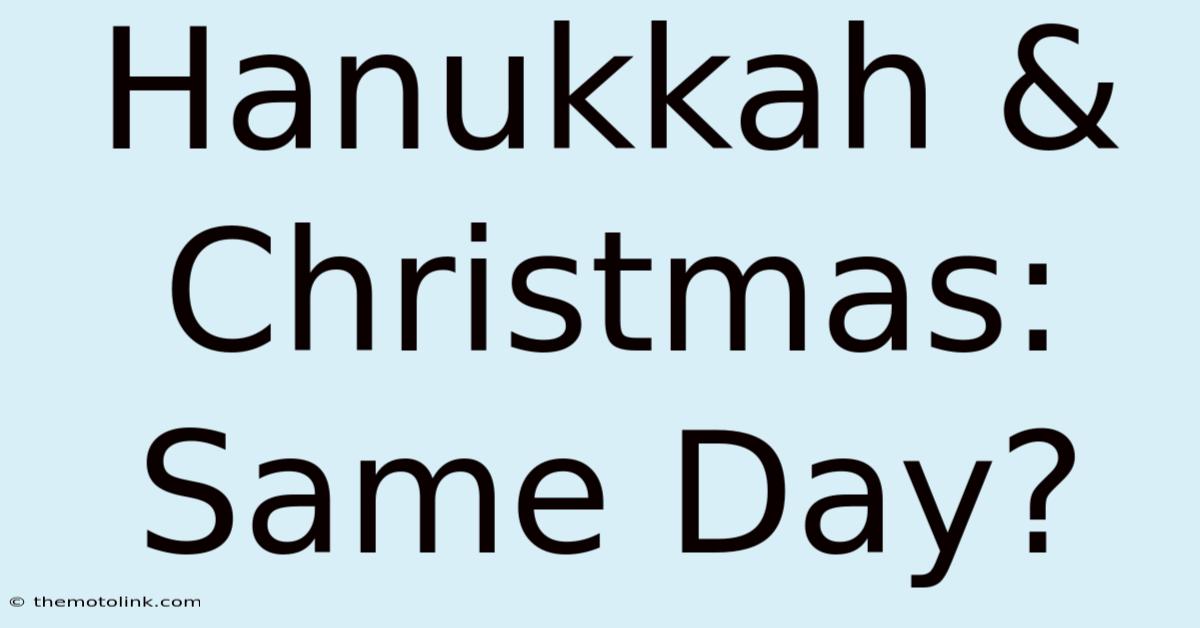Hanukkah & Christmas: Same Day?

Discover more detailed and exciting information on our website. Click the link below to start your adventure: Visit Best Website nimila.me. Don't miss out!
Table of Contents
Hanukkah & Christmas: A Rare Convergence & What It Means
Meta Title: Hanukkah & Christmas Same Day? Rare Convergence Explained
Meta Description: Hanukkah and Christmas falling on the same day is a rare event! Learn about this fascinating coincidence, its history, and what it means for celebrations.
The convergence of Hanukkah and Christmas – two major holidays celebrated worldwide – is a rare and noteworthy occurrence. This year, [Insert Year if applicable, otherwise remove sentence], the festivals coincide, sparking conversation and reflection on the unique intersection of Jewish and Christian traditions. This article delves into the reasons behind this infrequent alignment, explores the historical context, and offers insights into the significance of this shared celebration.
The Lunar-Solar Calendar Conundrum: Understanding the Timing
Hanukkah, the Jewish Festival of Lights, follows a lunisolar calendar, meaning its dates are determined by both the lunar cycle and the solar year. This results in Hanukkah's dates shifting annually, falling sometime between late November and late December. Christmas, on the other hand, adheres to the Gregorian calendar, remaining fixed on December 25th each year. The unpredictable nature of the Hanukkah calendar makes its coinciding with Christmas a relatively uncommon event. The last time this happened was in [Insert Year of last occurrence], highlighting the infrequent nature of this convergence.
A Historical Perspective: Two Distinct Yet Intertwined Histories
Hanukkah commemorates the rededication of the Second Temple in Jerusalem, a pivotal moment in Jewish history. The eight-day festival symbolizes the miracle of a single day's worth of oil lasting for eight days, emphasizing resilience and faith. Christmas, a Christian holiday, celebrates the birth of Jesus Christ, a central figure in Christianity. While these holidays have distinct origins and narratives, their proximity this year encourages reflection on the shared values of hope, light, and community that both festivals represent.
Celebrating Diversity: Navigating Shared Festivities
The simultaneous celebration of Hanukkah and Christmas presents a unique opportunity for interfaith dialogue and understanding. Many families who celebrate both holidays find creative ways to weave their traditions together, embracing the spirit of both festivals. This can involve combining elements of both celebrations, such as incorporating menorah lighting into Christmas festivities or sharing traditional foods from both cultures. This fusion of traditions reflects the growing appreciation for cultural diversity and the ability to find common ground amidst differing religious practices.
- Finding common ground: Many families find joy in sharing the themes of light, family, and giving present in both celebrations.
- Creative celebrations: Joint family meals incorporating traditional dishes from both Hanukkah and Christmas are becoming increasingly popular.
- Interfaith understanding: This rare coincidence provides an opportunity for dialogue and understanding between different faith communities.
Future Occurrences: When Will Hanukkah and Christmas Align Again?
Predicting the precise alignment of Hanukkah and Christmas requires complex calculations based on the lunisolar calendar. While exact dates vary, future occurrences are expected to be infrequent, making this year's convergence a special event. Using online resources dedicated to calendar calculations, one can find predictions for future coincidences, though these predictions are often years, even decades, out. This reinforces the unique nature of this current event.
Conclusion: A Moment of Shared Celebration and Reflection
The convergence of Hanukkah and Christmas is more than just a calendar coincidence; it's a symbolic moment emphasizing the shared values of hope, faith, and the importance of community. It presents a unique opportunity for reflection and celebration, fostering interfaith understanding and the appreciation of diverse cultural and religious traditions. What are your thoughts on this rare confluence of celebrations? Share your experiences and perspectives in the comments below!
Image Suggestions:
- A photo showing a menorah and a Christmas tree side-by-side. (Alt text: "Menorah and Christmas tree, symbolizing the convergence of Hanukkah and Christmas.")
- An infographic illustrating the lunisolar calendar vs. the Gregorian calendar. (Alt text: "Comparison of the lunisolar calendar and the Gregorian calendar.")
- A picture of a family celebrating both Hanukkah and Christmas together. (Alt text: "Family celebrating Hanukkah and Christmas together, showing interfaith harmony.")
FAQ (with schema markup suggestions):
Q: Why do Hanukkah and Christmas sometimes fall on the same day?
A: Hanukkah follows a lunisolar calendar, making its dates shift each year, while Christmas is fixed on December 25th. Occasionally, these dates coincide due to the varying nature of the lunar calendar. (Schema: {"@type": "FAQPage", "mainEntity": [{"@type": "Question", "name": "Why do Hanukkah and Christmas sometimes fall on the same day?", "acceptedAnswer": {"@type": "Answer", "text": "Hanukkah follows a lunisolar calendar, making its dates shift each year, while Christmas is fixed on December 25th. Occasionally, these dates coincide due to the varying nature of the lunar calendar."}}]})
Q: When will Hanukkah and Christmas next fall on the same day?
A: Predicting the precise alignment requires complex calculations. However, future occurrences are relatively infrequent, potentially decades apart. Check online resources for more precise predictions. (Schema: Similar structure as above, replacing question and answer with the relevant information.)
Internal Links (Example):
- [Link to an article about Hanukkah traditions]
- [Link to an article about Christmas traditions]
External Links (Example):
- [Link to a reputable source on the Jewish calendar]
- [Link to a website with Hanukkah/Christmas calendar predictions]

Thank you for visiting our website wich cover about Hanukkah & Christmas: Same Day?. We hope the information provided has been useful to you. Feel free to contact us if you have any questions or need further assistance. See you next time and dont miss to bookmark.
Featured Posts
-
Christmas Day Casino Restaurants Ms Coast
Dec 25, 2024
-
Miles Morales Gamings Die Hard
Dec 25, 2024
-
Hawai I Bowl Usf Vs San Jose State
Dec 25, 2024
-
Who Is Nate Bargatzes Wife
Dec 25, 2024
-
Sophie Hediger Swiss Snowboarder Dies
Dec 25, 2024
